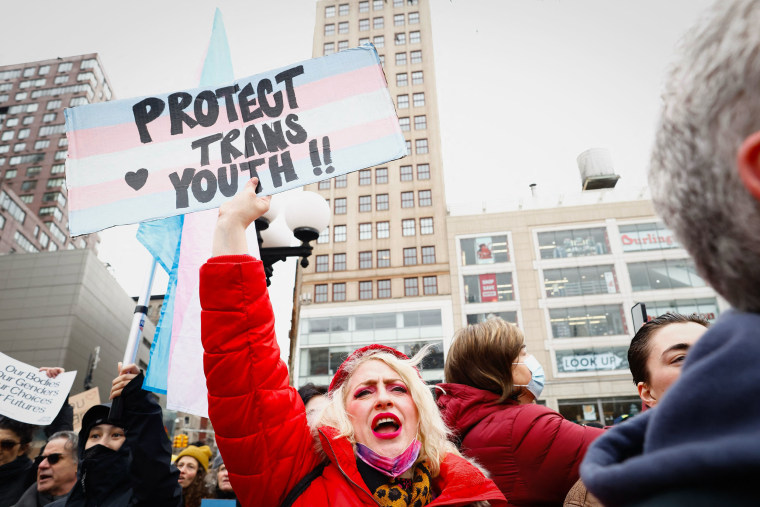A federal judge on Thursday temporarily blocked President Donald Trump’s executive order aiming to restrict transgender health care for anyone under 19.
U.S. District Judge Brendan Hurson of Maryland was skeptical of the government’s argument that the order is not a nationwide ban on care but rather a “general policy directive” and that the plaintiffs — who are trans teens and young adults whose care has been affected by the order — must wait to sue.
“In this situation, it is clear that these plaintiffs have received phone calls stopping their care, stopping their appointments, stopping their everything,” Hurson said at the hearing Thursday, adding that hospitals stopped care because of the order, which also seeks to prohibit federal funding of transition-related care for minors.
“I don’t know how you can credibly argue that this is not demanding the cessation of funding for gender affirming care,” he said.
Joshua Block, a senior staff attorney for the American Civil Liberties Union’s LGBTQ & HIV Project who represented the plaintiffs, said the executive order had “sown fear among transgender youth and confusion among their providers.”
“Today’s decision should restore both their access to healthcare and protections under the Constitution,” Block said in a statement. “Providers who’ve suspended healthcare for their transgender patients should be left with no doubt that they can lift those suspensions and continue to provide healthcare and act in their best medical judgment without risking their funding or worse.”
Harrison Fields, the principal deputy White House press secretary, said in a statement after the ruling that Trump’s executive orders “will hold up in court because every action of the Trump-Vance administration is completely lawful.”
“Any legal challenge against it is nothing more than an attempt to undermine the will of the American people, who overwhelming elected President Trump to secure the border, revitalize the economy, and restore common-sense policies,” Fields said.
The temporary restraining order will apply for 14 days. Omar Gonzalez-Pagan, an attorney for Lambda Legal, which is also representing the plaintiffs, said attorneys plan to ask for a preliminary injunction before the restraining order expires.

Days after Trump signed the order last month, hospitals in New York City, Colorado, Virginia, Illinois, Pennsylvania, Washington, D.C., and Los Angeles announced that they were suspending or reviewing their transition-related care for people under 19.
In response, the White House said in a statement that the order was “already having its intended effect — preventing children from being maimed and sterilized by adults perpetuating a radical, false claim that they can somehow change a child’s sex.”
Gonzalez-Pagan said hospitals should restart care following the judge’s order, “not only because it’s the right thing to do, but because this removes any doubt that they could lose the funding, at least for the time being.”
Thursday’s decision specifically blocks a section of Trump’s executive order titled “Defending Women From Gender Ideology Extremism and Restoring Biological Truth to the Federal Government,” which bars using federal funds to “promote gender ideology” and directs federal agencies to “assess grant conditions and grantee preferences and ensure grant funds do not promote gender ideology.”
It also blocks the part of another Trump order, “Protecting Children From Chemical and Surgical Mutilation,” that requires medical institutions receiving federal research or education grants to “end the chemical and surgical mutilation of children.”
The ACLU and Lambda Legal filed their lawsuit last week on behalf of two transgender young adults who are 18 and five families of trans minors. The suit argued that the orders discriminate against trans people. The care order allows the same treatments for other health conditions for people under 19 who are not transgender, the suit argued, adding that it is also illegal and unconstitutional because the president does not have the authority to withhold federal funds that have been approved by Congress.
Hurson appeared to agree with the argument that the president overstepped his authority. Questioning Block, he noted that Congress has failed to pass several bills seeking to limit trans health care for minors.
“It seems like pretty strong evidence that the executive order is doing what Congress is trying to do and has not succeeded,” Hurson said.
Hurson also said that the plaintiffs went through a long process to access care and that suddenly halting it “seems to put these children at extreme risk.”
Trump’s order aiming to curtail transition-related care for minors could add barriers as the care has become more difficult to access at the state level. In recent years, more than half of states have enacted restrictions on such care for minors.
The Supreme Court in December heard arguments in a lawsuit against Tennessee’s restriction and is expected to issue its decision this summer.
